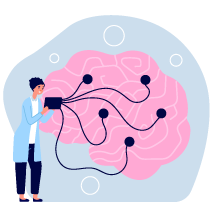Caring for Someone Living with Dementia

Terry Whitehead, Wellness Committee Member
Understanding Dementia
Dementia is a decline in cognitive function that interferes with an individual’s daily life, including their ability to think, remember, and reason. This condition is progressive, meaning the symptoms will gradually worsen over time. In the most severe stage, an individual will depend entirely on others to help them perform basic everyday tasks, such as dressing and feeding themselves. There are several types of dementia, including Alzheimer's, Lewy body dementia, Vascular Dementia, and Frontotemporal Dementia (FT).
When most people think about dementia, memory problems, especially short-term memory loss, usually comes to mind. However, dementia can also affect how an individual can solve problems and form sentences. They could begin to have trouble with regular activities such as driving, managing money, or taking medicine. If they used to be a great chef and suddenly mix up sugar with salt, or struggle with time or place, these could be signs. While dementia affects millions of people, it is not considered a normal part of aging.

Signs and Symptoms of Dementia
Dementia progresses differently from person to person. Like any condition, dementia has a wide range of symptoms, and come can be unpleasant or difficult for caregivers to understand. Some commons symptoms of dementia include:
- Short-term memory loss
- Confusion or repeating questions
- Frequently misplacing items like a wallet or keys
- Aggression or impulsiveness
- Sleep disturbances
- Changes in mood and behaviour
- Poor judgement or difficulty problem solving
- Experiencing delusions or paranoia
- Wandering and getting lost in familiar places
- Loss of balance or struggling with mobility
- Difficulty speaking, reading, and writing
- Struggling to complete daily tasks such as making meals or paying bills
Causes of Dementia
Dementia can occur when there is damage to the brain cells. Some potential causes might include abnormal proteins in the brain, reduced blood supply to the brain, nerve cells in the brain that stop working properly, or damage to the blood vessels in the brain. Someone who has had a stroke is at higher risk of developing vascular dementia. The risk of developing dementia can be increased due to factors such as:
- Head trauma
- Brain tumors
- Diabetes
- High cholesterol
- High blood pressure
- Substance abuse

Diagnosis and Treatment for Dementia
Everyone experiences some cognitive decline as they age. As you start to forget names or places, you might panic and wonder how to know for sure if you are developing dementia. If you or a loved one begin to experience symptoms, seek an evaluation as soon as possible. Doctors use a variety of methods to diagnose dementia with a high level of certainty, which can include:
- Physical examinations
- Reviewing medical history
- Blood tests
- Genetic tests
- Cognitive tests
- Brain scans
- Psychiatric evaluations
Testing is important because other conditions could mimic dementia, such as nutritional deficiencies, poor hearing, medication side effects, and depression. Identifying dementia early means receiving treatment sooner. While there is no cure for dementia, medication or non-drug therapies can help manage some of the cognitive symptoms, or changes in mood and behaviour.

Supporting a Loved One with Dementia
Your loved one with dementia is not capable of being aware of their problems. They see you as the one preventing them from doing what they want to do, and may see you as treating them like a baby. Learn a new way of communicating without trying to correct, argue, reason, or rationalize.
Here are a few tips to keep in mind as you navigate caring for a loved one with dementia:
- Choose kindness over truth. You may feel as though you are lying, but see it now as kindness. For example, when your father insists on going to work, tell him his boss phoned and gave him the day off.
- Pick your battles. If your mother says she is so fortunate to be able to see the ocean out of her window when it is actually the roof of the Canadian Tire building, admire the ocean with her.
- Join their world. Your loved one could wake up terrified because they think someone is watching them every morning. You might notice a mirror next to their bed and they no longer recognize their own reflection Instead of trying to rationalize with them, make them feel safe and by removing the mirror.
- Your actions are more important than your words. All your emotions and frustrations will be the emotions your loved one will reflect on you. For example, bath day is frustrating, and your loved one does not want her clothes removed. Smile and say how exciting it is to have a spa day and make it sound special.
- Show compassion not only for your loved one, but for yourself. Make sure to prioritize your mental and physical health. Take time for yourself by going for a walk with a friend, or plan a spa day. Accept offers of help from others, and don’t feel guilty asking for help. Maybe your sibling or friend can take turns spending time with your loved one. Cook simpler meals, don’t stress about housework not being done, and wear comfy clothes instead of trying to look perfect.
Remember the relationship you had before dementia and try to do some familiar activities like going on walks or watching a favourite show. You can even start new activities together, such as colouring or building a puzzle.
Try to help without them realizing you are helping. For example, serve dinner with the meat already cut up, switch to plastic cups saying how you discovered them and love using them, switch to pullovers instead of button-up shirts, tape up buttons on the remote so only the necessary ones are available, and switch to automatic payments of bills.
Find reasons for some of the symptoms being displayed. For example, wandering could mean they are seeking sensory stimulation they are not experiencing in their present environment.
Ask them to help with simple tasks such as folding towels, dusting, or combing the pet. The goal is to preserve your relationship and help them feel valued.
Your loved one is not trying to give you a difficult time; they are having a difficult time. Eventually, they will lose their ability to live alone and care for themselves. Changes will occur in their understanding, what they like, vision, taste buds, hearing, and smell. They may not realize they need help, or even want help. Keep in mind one day, your loved one with dementia will no longer be around. Will you look back with regret, or will you be comforted in knowing you did the best you could under the circumstances?
Sources
- Alzheimer’s Association. What Is Dementia? https://www.alz.org/alzheimers-dementia/what-is-dementia
- National Institute on Aging. What Is Dementia? Symptoms, Types, and Diagnosis. https://www.nia.nih.gov/health/alzheimers-and-dementia/what-dementia-symptoms-types-and-diagnosis
- Fisher Center for Alzheimer’s Research Foundation. Clinical Stages of Alzheimer’s https://www.alzinfo.org/understand-alzheimers/clinical-stages-of-alzheimers/
- Diane Dettmore, et al. Aggression in Persons with Dementia: Use of Nursing Theory to Guide Clinical Practice. Geriatric Nursing. January/February 2009 https://www.sciencedirect.com/science/article/abs/pii/S0197457208000864?via%3Dihub
- Mayo Clinic. Alzheimer’s: Managing Sleep Problems. https://www.mayoclinic.org/healthy-lifestyle/caregivers/in-depth/alzheimers/art-20047832
- Anna D. Burke, et al. Hypersexuality in Dementia: A Case Presentation with Discussion. The Primary Care Companion for CNS Disorders. Oct. 31, 2013. https://www.ncbi.nlm.nih.gov/pmc/articles/PMC3907317
- Alzheimer’s Association. Support Groups. https://www.alz.org/events/event_search?etid=2&cid=0
- Courses and videos on dementia. careblazers.com